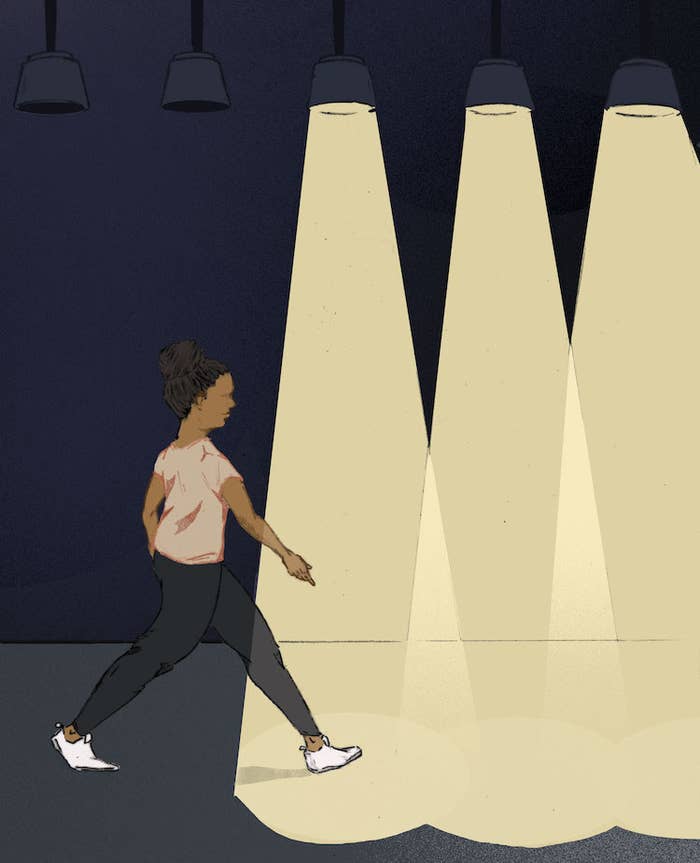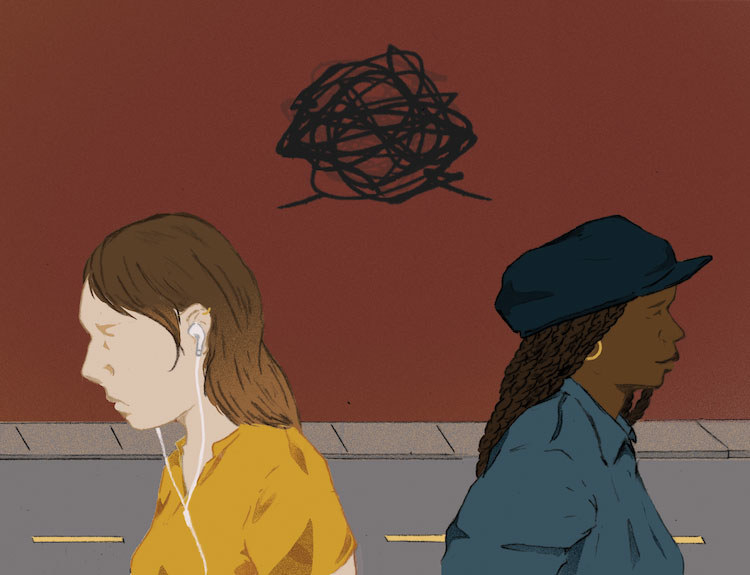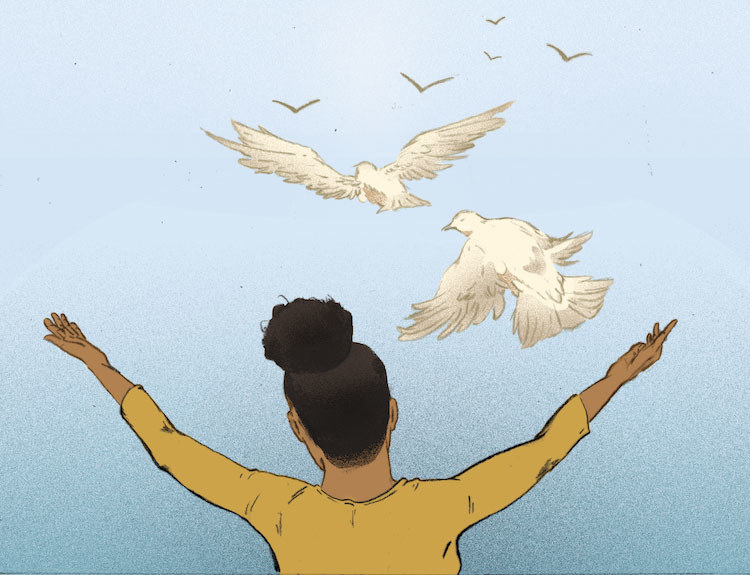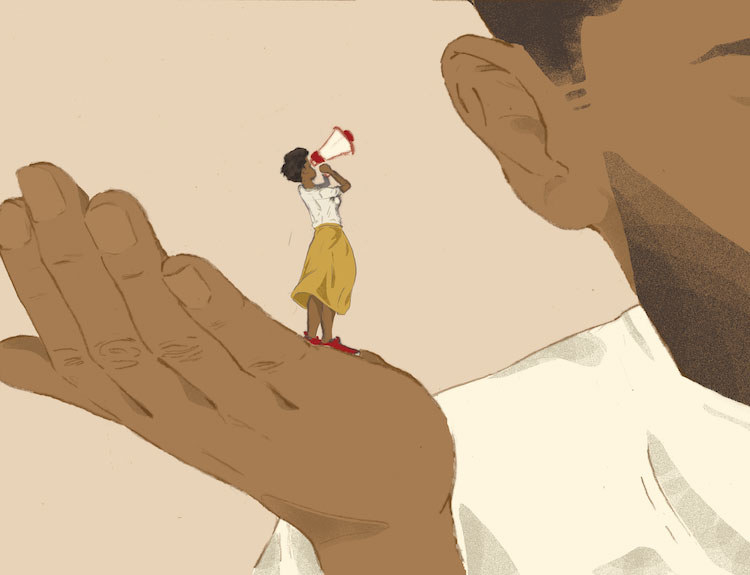
1. Sometimes, the label of being a “strong black woman” hurts more than it helps.
When I was a 26-year-old newlywed in grad school, I was working full-time at a nonprofit and part-time as a tutor to make ends meet, and in the midst of an account-draining and emotionally taxing custody battle against my then-husband’s ex-wife. At first, I reveled in the challenge of “holding it all together." But as time passed and my stiff upper lip weakened, it became harder to maintain the poker face I wore for the sake of others. I lost weight and sleep. I cried in the shower every single night. I stuffed my depression away.
Through it all, my husband praised me for being a strong black woman.
When someone says “strong black woman,” a lot of things come to mind. A strong black woman is a woman who can withstand anything with equal measures of grace and attitude. She’s the long-suffering, hardworking pillar of the black community. But as powerful as the label is, it can also become a burden when you’re not feeling particularly strong. It becomes yet another perception to uphold, until the pain you bottle up compounds over time, like a festering wound you keep putting a Band-Aid over. And then, suddenly, you aren’t strong anymore. You’re angry and bitter. You’re unstable and weary.
You don’t have to be perfect all the time, and it’s okay to let others know that you’re struggling with something or need help. It doesn’t mean you’re weak. It just means you’re human.
2. You have to get past the stigma associated with mental health in the black community.
Even though African-Americans are 10% more likely to suffer from mental health problems than the general population, only one-quarter of them seek mental health care, compared to 40% of white people — likely in part because there is an undeniable stigma attached to seeking mental health help in the black community. Some people may tell you to hang in there because we’re a “strong people.” Others still may outright call you weak.
This stigma first reared its close-minded head when I was in college. At the time, being a black nerd was not en vogue at a historically black college and I gave up writing fanfiction, drawing cartoons, reading manga, watching anime, and playing video games to be more like everyone else. The pretending was frightening, lonely. I tried talking to my friends about how I felt and the responses I received ranged from, “Here, take a shot and you’ll feel better” to “It’s just a part of the college experience.” Upon my meek statement that I might need to talk to a professional, they told me, “It won’t do any good. Shrinks are full of shit.”
Because of this pervasive attitude, I found myself trying to explain away debilitating moods and faking a strength I didn’t feel. I drank, I partied, I fit in, but it was at the expense of getting the help that would fix the deeper issue. In hindsight, I should have marched down to the counselor's office, but I was already enough of a misfit that I didn’t want to risk further exclusion. It takes courage to say screw the stigma, but once you do you’re one step closer to finding peace.
3. Depression, anxiety, and suicidal tendencies aren’t “white” maladies.

4. Bottling things up leads to bad coping mechanisms, so it’s important to get the help you need.
At different points in my life, I’ve used alcohol, drugs, and sex as a way to cloak the pain I constantly stuffed into the deepest pockets of my being. I drank to the point of blacking out every single night of the week. I used drugs to try and feel like “my old self.” I developed romantic and sexual relationships that would allow me to focus on someone else other than the sadness I couldn’t seem to shake. I tried to hide my pain for a very long time.
Until I couldn’t anymore. It all came to a head one winter evening when I called a suicide hotline, already drunk and ready to down a full bottle of sleeping pills to go with it. All my regular lifelines — men, alcohol, partying, grinning and bearing it — were failing. I knew I was crashing. A complete system failure. I downed a 1.5-liter bottle of Cabernet Sauvignon on top of the sake I had at dinner. Irrational as it was, I believed calling my parents at 2 a.m. and blindsiding them with my dark thoughts and heartache was somehow worse than killing myself. The two friends I did call messaged me to say they would call back later, and I didn’t want to destroy the fun they were having with something as heavy as this. Even at this point, I was too afraid to take the mask off my depression and stare it in the eyes.
I was more lost and alone than I’ve ever felt in my life, and the woman on the other end of the hotline was the first person I bared all to — all the things I was afraid to tell my parents or friends for fear of judgment or making them uncomfortable. I unpacked the dark places I went to in an effort to “fix” myself, and realized that my “solutions” only exacerbated my depression and anxiety.
To be clear, the call didn’t fix me either. What it gave me was an outlet and an opportunity to take an objective step away from a knee-jerk decision. It was then that I made the decision to find a therapist to unlearn my self-destructive habits and get to the bottom of my depression. I didn’t ever want to get back to a point where I was so far gone that suicide seemed like the only solution.
5. Accepting where you are mentally can be liberating.

6. Seeking help isn’t always straightforward, and might be pretty frustrating at times, but that shouldn’t stop you from trying.
Mental health issues can manifest differently depending on factors like ethnic identity and upbringing, so mental health issues like clinical depression can look and feel different for black people than they do for white people. For example, according to the National Alliance on Mental Illness (NAMI), African-Americans, especially women, are more likely to experience and tell doctors about physical symptoms related to mental illness (like describing body aches and pains when talking about depression), but a doctor who’s not culturally competent might not recognize these as symptomatic of a mental health issue.
Because medical professionals aren’t always hip to the difference, there’s a chance you might get misdiagnosed or subpar care. Not to mention, there’s a lack of black medical professionals in the mental health arena, and you may have difficulty connecting or opening up to a white mental health provider who doesn’t know the nuances of the black experience.
Seeking help is a very personal endeavor, and you should take the time to find a doctor who you are comfortable with. There is no rule that says you have to stick with the first doctor you try. Shop around and try out different mental health professionals until you find a provider you feel can truly help you. I went through three therapists before I found one that put me at ease and created a safe space for me to share the things I struggled with. If you can’t open up to the person you’re getting help from, go find someone else. The last thing you want to do is put on yet another mask that hides your truth.
7. You shouldn’t allow people to belittle or dismiss what you are experiencing.

8. Effective treatments will most likely involve a combination of things.
There is no one-size-fits-all remedy. Seeking help for mental health issues is a deeply personal experience. As a black woman, you may find that the solutions that work for others may not work for you. I’ve been told to pray, to fast, and to go to church more to loosen the “demon of depression” binding my life. While my faith has, and always will be, a large part of my person, and helps immensely in helping me navigate my darker moments, it is not the end-all-be-all solution. Mental health issues are not something you “pray away.”
It took some time, but I found a winning combination that helped me battle anxiety and depression. For me, that mix involved getting off social media for a while, spending more time in nature and exercising, prayer, and talking to a counselor. For others, it may be medication, a mental health sabbatical (Eat, Pray, Love anyone?), leaning on the love of friends and family, or drawing strength from community groups. If you’re concerned about cultural relatability, finding a black therapist or psychiatrist to speak with can make difficult conversations a bit easier.
Since then I’ve reconnected with my nerdy side and am much more open about where I am emotionally and mentally with others. I still have dark days, but I know how to cope with them in a positive way. I’m a better me for embracing my mental illnesses, and doing what I must to address them. No matter what mental health issue you are battling, remember this, my sister: You are wonderful, you are beautiful, and you are never alone.
Kathryn De Shields is a writer, entrepreneur, and indie game aficionado based in Atlanta. You can check out her work on Culturyn or tweet her @culturynlife. She'd love to e-meet you.
To learn more about depression, check out the resources at the National Institute of Mental Health here.
And if you need to talk to someone immediately, you can reach the National Suicide Prevention Lifeline at 1-800-273-TALK (8255) and or the Crisis Text Line by texting HOME to 741741. Suicide helplines outside the US can be found here.
Follow along at BuzzFeed.com/MentalHealthWeek from Oct. 2 to Oct. 8, 2017.


